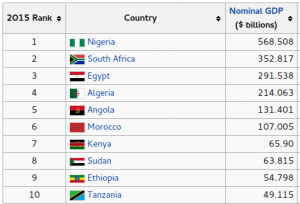Just cruising down the Ibadan – Lagos expressway at 120+ km/h when traffic from the other lane of the dual carriageway suddenly joins ours:
Welcome to Nigeria! This bizarre (but somehow functional) experience came to summarize my general feeling about Nigeria when I spent a few days working there last week. It’s something tragically comic, like, “How can this possibly be normal?”
I had intended to write about my experiences — watching Chinese tourists passing wads of US dollars to airport officials, airport security asking for “some Naira” from my pocket during frisking, the unavailability of any coffee except Nescafé, etc — but when I started thinking about it all I realized it was actually just tragic.
Tragedy in a Nutshell
Humorous anecdotes about driving habits might be one indicator of societal health, but numbers are so much better at quantifying…

For example, Nigeria has the largest economy in Africa, with a nominal GDP of $568 billion in 2015. To put that in perspective, it’s roughly ten times larger than Kenya’s ($65 billion) and one third of India’s ($1.5 billion). Impressive, yes, but the casualties of this massively industrialized economy are plain to see: disused petroleum trucks, broken down cars, piles of old tires, dilapidated buildings, etc are littered nearly everywhere along the side of the road on the three-hour drive from Lagos to Ibadan.
Powering this economy is a population that has ballooned to 184 million people in the last few decade — also the largest in Africa. Tragically, those people live in one of the most dangerous countries in the world according to the Global Peace Index (where Nigeria has slipped from from #118 to #151 in the past decade) and yet the population is estimated to reach 400 million by 2050. Talk about competition for resources!
To make matters worse, it’s crystal clear that this massive economy has come at an enormous cost to the environment:
Nigeria, once in the heart of the tropical rainforest belt, has lost about 95% of its total forest cover and now has to import 75% of the timber it needs for its own purposes1.
Having cannibalized nearly all of their natural resources to get where they are now, how will they balance the impending massive demand for resources in the future and continue to have any economy at all?
Five Days in Nigeria
I’m grateful for having had the opportunity to visit Nigeria (I had gone to work with colleagues from the International Institute of Tropical Agriculture (IITA) on aspects of their open access implementation), but the trip left me with a feeling of despair. I’ve lived in Africa for eight years, so I’ve seen corruption, poverty, poor infrastructure, etc — but not like this. This is on another level.
Take care, Nigeria…
Footnotes
[1] “Nigeria and its forests”, Source: Focus on Forests, http://www.focusonforests.org/fcontent/nigeria.htm (retrieved October 24, 2015)